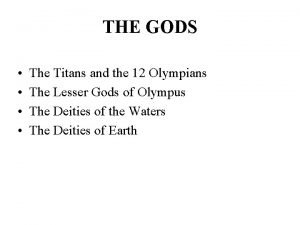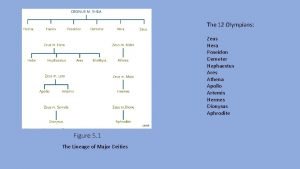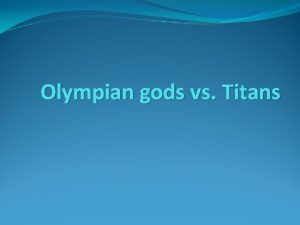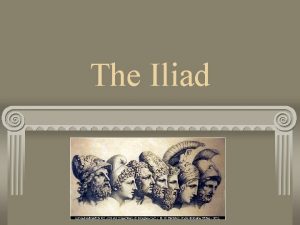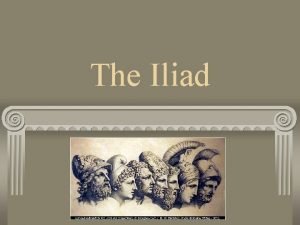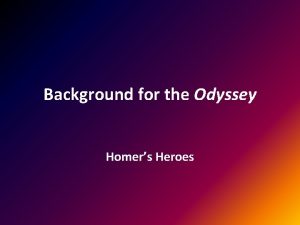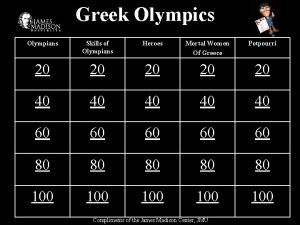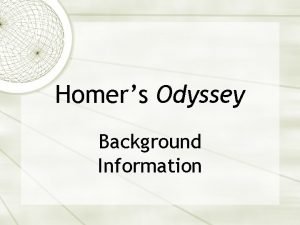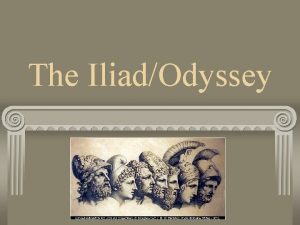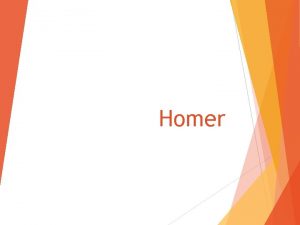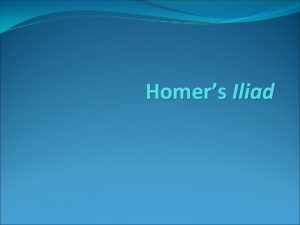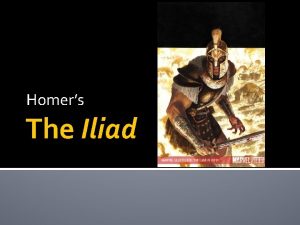THE OLYMPIANS AND THEIR ROLE IN HOMERS ILIAD













- Slides: 13

THE OLYMPIANS AND THEIR ROLE IN HOMER’S ILIAD

THE OLYMPIANS 1. Zeus (Jupiter) 8. Hermes (Mercury) 2. Hera (Juno) 9. Artemis (Diana) 3. Demeter (Ceres) 10. Ares (Mars) 4. Hades (Pluto) 11. Pallas Athena (Minerva) 5. Hestia (Vesta) 6. Poseidon (Neptune) 7. Phoebus Apollo 12. Hephaestus (Vulcan) 13. Aphrodite (Venus)

THE ROLE OF THE GODS… Ancient Greece was a polytheistic culture versus today’s more monotheistic culture. n The Greeks see the gods as: q Awe-inspiring q Dangerous q Powerful beings whom it is wise not to offend n Homer uses the gods to underscore the tragedy of the human condition. q Often in the Iliad, the gods and goddesses are portrayed as shallow, petty, etc. q They complain, and fight amongst themselves. q They watch the war, and may even get involved in points, but they can’t be seriously hurt by this war. q This highlights the tragedy of human courage and self sacrifice that will happen throughout the course of the epic. n

THE HOMERIC GODS ARE NOT… n consistently good, or merciful, or even just n omniscient (all-seeing) n omnipotent (all-powerful) n transcendent – they did not create the universe, but are part of it n in relationships with humans which are based on mutual love n able to override fate

THE HOMERIC GODS ARE… n personified forces of nature on the most basic level (Ex: Ares is war) n the controllers of these forces of nature n anthropomorphic – they share human form, human passions, and human emotions

THE GODS AND FATE (MOIRA)… n Moira roughly translates as “share of life” n Generally, a human does not know their moira ahead of time n The gods seems to know the individual’s moira (Ex: Thetis knows Achilles’ fate, Zeus knows Achilles will kill Hector) n However, the gods are part of the system. They CANNOT intervene with a person’s moira. There will be a point, however, when Zeus seriously contemplates doing so.

THE MYTH OF THE GOLDEN APPLE & THE JUDGEMENT OF PARIS

n n First, it is assumed by Homer that we know what events precipitated the Trojan War. So we must know the background story… q q The Goddess of Discord, Eris, was not invited to the wedding of King Peleus and the sea nymph Thetis (Achilles’ parents) when all the rest of the gods and goddesses were. So to cause trouble and retaliate, Eris throws a golden apple into the banquet hall with an inscription that read “For the Fairest. ” So of course, all the goddesses want it. The choice, however, is narrowed down to Hera, Aphrodite, and Athena.

n Deciding to stay out of it, Zeus says Paris, a young shepherd and prince of Troy, will decide. q n Instead of judging the goddesses’ beauty, he is presented with three different bribes: q q q n Paris, currently living with a lovely sea nymph named Oenone, was working as a shepherd because his father Priam, King of Troy, had been warned that Paris would one day ruin his country. Hera – He will be Lord of all Europe and Asia Athena – He will lead the Trojans to victory against the Greeks Aphrodite – He shall have the fairest woman in all the world Paris ends up giving the apple to Aphrodite, but there’s a catch…

n Paris chooses Helen, the fairest of all mortals. But she is… q q The daughter of Zeus and Leda (mortal) The WIFE of King Menelaus of Sparta, who is the brother of King Agamemnon n Paris tricks Menelaus into letting him stay at his home in Sparta while the King is away. n Thus Helen is stolen and taken to Troy. n Paris’ abduction of Helen is a violation of the code of xenia q q Xenia is the guest-host relationship It was a code that governed the behavior between the two parties.

SO WHY DID THIS START A WAR? n There’s the obvious insult to Menelaus n The vow to Tyndareus (Helen’s father) q q q n Before she married Menelaus, Helen had been pursued by many suitors. Fearing retaliation from the scorned suitors, Tyndareus made all the suitors vow that if any wrong was done to Helen’s husband, whoever it may be, they would all champion his cause. Thus, they are all bound to defend Menelaus’ honor when Helen is abducted. So Helen became one of the most famous women in history as she is know to have “the face that launched a thousand ships”

n Menelaus calls on all the chieftains to help. All respond eagerly, except for two… q q Odysseus, King of the island of Ithaca, shrewdest and most sensible man, did not want to leave his house and family to go overseas and fight for a faithless woman. Achilles, the Greeks’ greatest warrior, is sent by his mother Thetis, who knows he is fated to die at Troy, to hide in Lycomedes’ court disguised as a woman.

GODS: Hera Athena Poseidon GODS: Aphrodite Apollo Zeus* Agamemnon Achilles Menelaus Ajax Patroclus Nestor Calcus Odysseus Diomedes Paris/Helen King Priam/Hecuba Hector/Andromache Aenaes Helenus Glaucus
 Homers epic poem
Homers epic poem Homer life
Homer life Percy jackson chapter 6 summary
Percy jackson chapter 6 summary Chapter 2 of percy jackson and the lightning thief
Chapter 2 of percy jackson and the lightning thief Zeus and the rise of the olympians
Zeus and the rise of the olympians 12 titan gods
12 titan gods Who are the 12 olympians
Who are the 12 olympians Twelve olympians symbols
Twelve olympians symbols Titan vs olympian
Titan vs olympian 12 great olympians
12 great olympians Azure web role worker role example
Azure web role worker role example Iliad introduction
Iliad introduction Menoitius
Menoitius Homer work
Homer work





